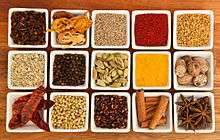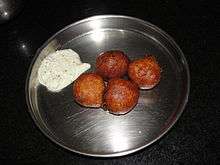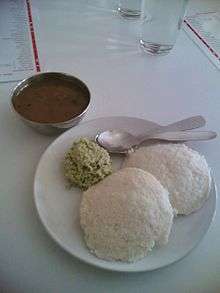Udupi cuisine
 |
| This article is part of the series |
| Indian cuisine |
|---|
|
Regional cuisines
|
|
Ingredients, types of food |
|
See also
|
|
Udupi cuisine (Tulu: ಉಡುಪಿ ವನಸ್) is a cuisine of South India.[1] It forms an important part of the Tuluva Mangalorean cuisine and takes its name from Udupi, a city on the southwest coast of India in the Tulunadu region. Udupi cuisine has its origin in the Ashta Mathas of Udupi founded by Madhvacharya.
Udupi cuisine comprises dishes made primarily from grains, beans, vegetables, and fruits. The variety and range of dishes is wide, and a hallmark of the cuisine involves the use of locally available ingredients.
It adheres strictly to the Satvik tradition of Indian vegetarian cuisine, using no onions or garlic, as well as no meat, fish, or shellfish. However, the cuisine may also be adapted for those who consume these restricted items. Following the tradition of chaaturmasa vrata, which is a restriction of certain food ingredients in a certain period or season, may have led to the innovation of a variety of dishes in Udupi cuisine.[2] Pumpkins and gourds are the main ingredients in sambar, a stew prepared with ground coconut and coconut oil as its base.
The ubiquitous Indian dish dosa has its origins in Udupi, according to P. Thankappan Nair.[3] Saaru, a spicy pepper water, is another essential part of the menu, and so are jackfruit, colocasia leaves, raw green bananas, mango pickle, red chillies, and salt. Adyes (dumplings), ajadinas (dry curries), and chutneys, including one made of the skin of the ridge gourd, are specialities.[4][5]
Typical dishes

- Saaru or rasam
- Koddelu or sambar
- Menaskai (variation of Sambhar)
- Huli (Similar to sambhar with ground coconut in the base)
- Tambuli or watery vegetable paste (generally leafy vegetables) seasoned
- Spiced rice
- Adde or Uh-day (a 'pancake' of various grams)
- Tallu or Ajethna or ajadina (dry curry)
- Ale Bajji
- Bakshya (sweet or dessert)
- Kosambari (seasoned salad of lentils)
- Bajji
- Kayathno or KaaYaadhina (fried items)
- Paramanna (kheer)
- Paayasa (kheer)
- Rasayana (juice or squash or syrup)
Dishes served in a full course Udupi meal



The full course Udupi meal is served on a plantain leaf, which is traditionally kept on the ground. The dishes are served in a particular sequence, and each dish is placed on a particular spot of the plantain leaf. All the people eating this meal are expected to begin and end eating the meal together. A person cannot get up in middle of the meal, even though he has finished his meal. The start and end of meal is done by saying "Govinda," the name of Lord Vishnu. A typical meal is served with the following (in sequence):
- Abbhigara or Ghee
- Salt
- Pickle
- Kosambari (seasoned salad made from split Bengal gram or pea)
- Bajji or chutney
- Ajethna
- Spiced rice (chitranna)
- Happalla
- Steamed rice (plain rice cooked in steam or boiling water)
- Saaru and Rasam (a spicy watery soup)
- Menaskai
- Koddelu
- Sweets like laddu, holige or Kesari bhath
- Fried items like bonda, chakli, vada
- Paramanna or Kheer (pudding) or Payasa
- Buttermilk/curd
Depending upon the occasion, individual taste, and money, each dish may be made from different ingredients.
Popular dishes of Udupi cuisines
- Saaru or rasam (rasam made from lentil and tomato)
- kodhel or sambar (sambar made from lentil, coconut and vegetable of choice)
- Sajjige and bajil (upma made from coarse semolina and seasoned beaten rice)
- Uddinahittu (urad flour or potato mashed mixed in curd and seasoned)
- Kosambari (salads of green gram or Bengal gram lentils, seasoned)
- Different types of spicy rices, such as chitranna or Bisi bele bath
- Dosa, masala dosa, neer dose
- Sweet dishes like sajjige, maddi, kaai holige, undae (laddu)
- Puddings or parammanna or payasa or kheer
- Mangalore bajji or golibaje
- Kashi halva from musk pumpkin, jackfruit, banana, and bottle gourd
- Pelakai gatti/gidde (jackfruit dumpling)
- Pelakai appa (fried dumplings made from jackfruit)
- Pelakai halwa (jackfruit halwa)
- Gashi or Ghasi (thick gravy like dish made by use of peas or pulses with coconut)
- Patrode (colacasia leaves dipped in batter and steamed cooked)
- Menaskai (especially made of Amtekai or ambade)
- Putnis
- Kadubu
An overview of Udupi cuisine
| Name | Veg. or non-veg | Ingredients | How to prepare | Image | Remarks |
|---|---|---|---|---|---|
| Masala Dosa | Pure Veg. | Rice, Urad, Aloo and onion | Dosa with ghee; aloo,onion sabji rolled inside | Invented by Udupi hotels | |
| Patrode | Pure Veg. | colacasia leaves, Rice | colacasia leaves with rice flour baked in steam | Popular during rainy season | |
| Kotte kadubu | Pure Veg. | Rice, Urad | Baked in steam inside jackfruit leaves | ||
| Neer Dosa | Pure Veg. | Rice | Dosa with rice flour; easy to prepare | sides important | |
| Undla kai | Pure Veg. | Rice | Rice balls baked in steam | Rainy season dish | |
| Shyavige or Othu shyavige | Pure Veg. | Rice | Ancient noodles, prepared by pressing rice balls | ||
| Goli Baje | Pure Veg. | Maida flour | Fried in oil | Also called Mangalore bajji | |
| Halasina Kadabu | Pure Veg. | Rice, Jackfruit | Rice and jackfruit ground and baked in steam | ||
| Thambuli | Pure Veg. | coconut, buttermilk, brahmi leaf | |||
| Kolkesia Chatney | Pure Veg. | Kolkesa leaf, coconut | |||
Udupi restaurants and hotels
Udupi or Udipi restaurants and hotels serving Udupi cuisine can be found all over India and many parts of the world. In the past, these restaurants were run by cooks and priests trained at Krishna matha in Udupi.[6] With rising popularity, many others have entered this business claiming to serve authentic Udupi cuisine.[7] Most Udupi restaurants and hotels are family run, with ownership passing among kith and kin of the original owner.[8] Udupi restaurants have undergone many changes in their menu in recent times, adapting to changing economic structure and social statuses in India. They have included vegetarian delicacies from other Indian cuisines.[9]
The first major South Kanara hotel owner, K. Krishna Rao, who worked first joined Sharada Vilas Brahmins Hotel in George Town as a kitchen servant. In 1925 his employer offered him one of his restaurants for Rupees 700 monthly. In 1939 Rao started his first hotel, now called Old Woodlands.[10] The other prominent chain of Udupi hotels is the Dasaprakash group founded by K. Seetharama Rao, who gave up a low-grade salaried position in Mangalore to join his brothers' snack food ("tiffin") business in Mysore in 1921.
In recent years, the Udupi restaturants in Bombay have been struggling and yielding to McDonalds and other fast food restaurants[11] It has been reported that around 90 Udupi hotels across Mumbai and its suburbs closed due to rising costs, that include 5 per cent service tax and 5 per cent VAT. Some are unable to compete with chains such as Saravana Bhavan and Adyar Ananda Bhavan.[12]
See also
- Cuisine of Karnataka
- Mitra samaja
- Mavalli Tiffin Room
- New Woodlands Hotel
- Arab Udupi, a new group of non-traditional restaurants in the Middle East that offer non-vegetarian dishes also
References
- ↑ "Udupi". www.karnataka.com. Retrieved 2009-09-23.
- ↑ "Chaaturmasa vrata". www.shivallibrahmins.com. Retrieved 2009-09-23.
- ↑ Nair, P. Thankappan (2004-01-01). South Indians in Kolkatta. Punthi Pustak. p. 455. ISBN 9788186791509.
- ↑ "Announcing RCI 09". www.monsoonspice.com. Retrieved 2009-09-23.
- ↑ "Udupi".
- ↑ "Utterly Udipi". www.thehinduonnet.com. Retrieved 2009-09-23.
- ↑ "In Udupi,food is the greatest binder". www.in.rediff.com. Retrieved 2009-09-23.
- ↑ UDUPI HOTELS: ENTREPRENEURSHIP, REFORM AND REVIVAL, Asian Dynamics Conferences, Copenhagen, June 18, 2009, Stig Toft Madsen, Geoffrey T. Gardella
- ↑ "Ingredients in melting". mumbaimirror.com. Retrieved 2009-09-23.
- ↑ UDUPI HOTELS: ENTREPRENEURSHIP, REFORM AND REVIVAL, Asian Dynamics Conferences, Copenhagen, June 18, 2009, Stig Toft Madsen, Geoffrey T. Gardella
- ↑ Udupi hotels need to reinvent to survive, Ahar Hospitality, Jan - Mar 2014 Vol. 1, Issue- 4
- ↑ Udupi hotels, an ode to way of life, R. SRIKANTH, The Hindu, August 9, 2014
Further reading
- Yu. Bi Rājalakṣmī, Udupi Cuisine, Prism Books Pvt Ltd. ISBN 978-81-7286-175-9.
- Malati Srinivasan and Geetha Rao,The UDUPI KITCHEN, Westland Ltd.ISBN 978-93-85152-06-1.